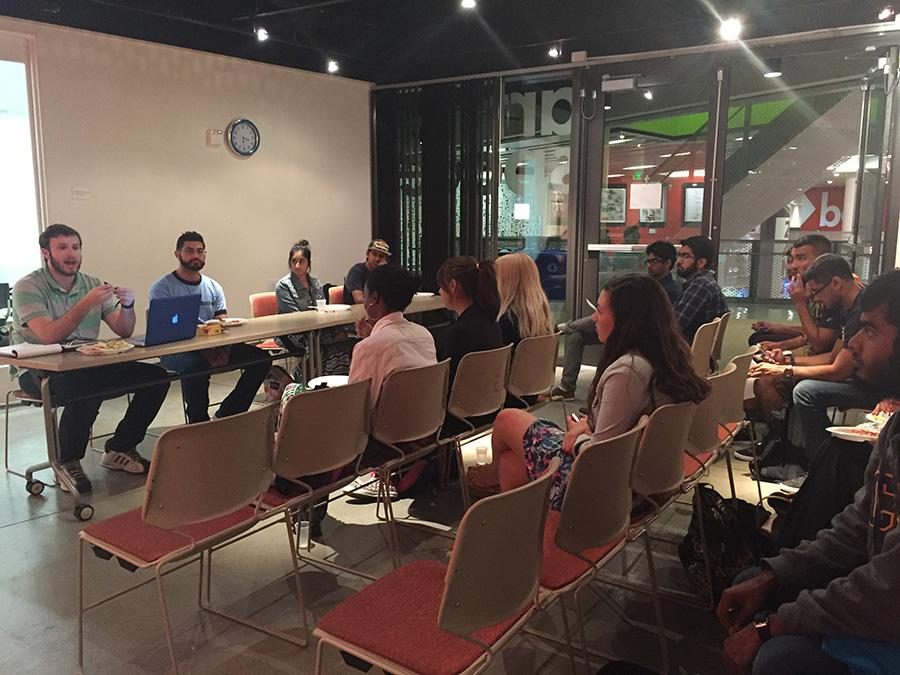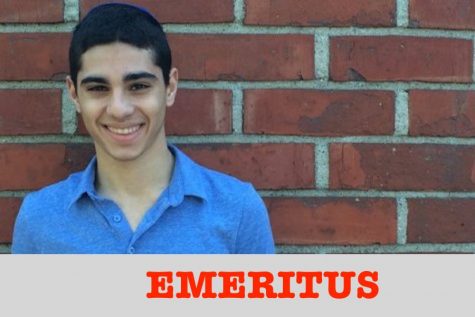UC San Diego building $5 million Kosher-Halal dining hall to open in 2016, first in UC system
Union of Jewish Students collaborated with the Muslim Student Asscoiation; Zev Hurwitz ‘11 led two-group effort
COOPERATING: UJS members Zev Hurwitz and Jonah Saidian and Hibah Khan and Yasin Ahmed of the Muslim Students Association led a Town Hall meeting at UCSD in November.
May 8, 2015
Could simple expressions like “pass the falafel” build peace between Muslims and Jews on California college campuses?
Students at the University of California, San Diego, may soon find out.
UCSD has announced plans to open up a joint Kosher and Halal dining hall in the fall of 2016, after the Union of Jewish Students (UJS) and the Muslim Student Association (MSA) collaborated for nearly two years to make it happen.
The project, expected to cost about $5 million according to a “request for proposals” published by the university last month, is a first for the UC system.
“There was a major void and we found an opportunity to fill that void,” said Zev Hurwitz, Shalhevet class of 2011, who spearheaded the project as Executive Vice President of UJS, along with UJS President Sam Hauss.
The two leaders told the UJS board in late 2013 that they were going to contact the MSA.
“The whole campaign stems from two parts,” said Zev, who is the brother of senior Mati Hurwitz. “One is discovering the need, what it is that observant students on campus are lacking, and being one of those observant students helped drive me in the search for part two, which is what is the solution and how could we get there.”
Jewish students at UCSD have long had issues with finding food options on campus. Students living in campus are required to pay for the dining hall service, but observant Jews have been unable to eat the food there because it isn’t kosher.
As a freshman in 2012, Zev successfully petitioned the school for pre-packaged kosher meals they could buy with their dining dollars. Those meals, catered by Emuna Foods, will continue to be used until the kosher dining hall opens.
Getting approval for a new dining hall took longer. First, in the spring of 2013, UCSD had conducted a survey asking what issues the university needed to solve. In response, UJS started a letter-writing campaign that drew the attention of the UCSD administration, Zev said.
Muslims, meanwhile, had been facing a similar problem. The majority of observant Muslims had to limit themselves to the vegetarian options at the dining halls because the meat didn’t meet the standards of Muslim “halal” dietary laws.
Realizing that the two groups were coping with the same problem, the UJS asked the MSA to collaborate on a written proposal that would serve both groups’ interests.
“Working with the Muslim association was a strong opportunity to showcase joint advocacy,” said Zev. “We basically met with them and said this does not have to do with the Israeli-Palestinian issue, this is something we need day to day and we think you can be great partners. They gave us unanimous support and said they’re all in.”
Hibah Khan, a member of the MSA who also worked on the proposal, said she wanted to be a part of the project to prevent future Muslim students from facing the problem she had.
“This was personally importawnt to me because I had a lot of dietary restrictions due to my religion,” Hibah said. “I felt that it would be nice to help other people out who would go through the same struggles I had to go to.”
Halal, which means “permissible” in Arabic, sets several restrictions on food and beverages for observant Muslims. Like the laws of kashrut, it forbids swine, and both halal and kashrut enforce specific guidelines for how to slaughter an animal. Like Kashrut, halal also forbids consumption of blood. It also forbids any alcohol.
The proposal for the new dining hall was approved unanimously by UCSD’s Associated Student Council in May 2014, and given the final green light by the university March 9. The university will renovate one of its dining halls, Oceanview Terrace, to create the station, and the building will also include a prayer room open to all students, according to UTSanDiego, a daily newspaper published in the San Diego area.
Zev, who graduated from UCSD this year and is now working for the American Jewish Committee in Los Angeles, said he encountered no real resistance to the project. However, since it is a multi-million dollar investment for the university, there were a lot of steps and approvals to obtain.
There are other college campuses where Jewish and Muslim students use the same dining service, but none in the UC system.
Aviva Walls, Shalhevet Director of College Counseling, thinks there will be more Shalhevet applications to UCSD as a result of the upcoming dining hall.
“I would expect applications to UCSD from Shalhevet to increase probably to similar levels as UCLA and Berkeley,” Ms. Walls said.
The new dining hall at UCSD would make that campus more kosher-friendly than Berkeley or UCLA. The two larger campses have active Hillel houses and some availability of kosher food, but no plans for a kosher dining hall.
At UCLA, Jewish groups tried unsuccessfully for a year to start a joint kosher-halal meal plan, beginning in 2012. According to UCLA alumnus Tzvi Wolf, who took part in the discussions, the talks dining hall ended in the summer of 2013, though talks for a Kosher dining hall continue.
“First, we could not find a provider of meat that was kosher certified with a halal certification suitable for the student in the UCLA chapter of MSA,” Tzvi said.
“Second, UCLA Dining and the Office of Residential Life urged us to stop working toward a joint kosher-halal plan because the asks were different. Mainly, halal meat has no restriction on the equipment it can be cooked on, while kosher food does.”
According to Shalhevet alumna Ariela Feitelberg ‘13, now a UCLA sophomore, kosher options there are limited – and expensive.
“I eat vegetarian here because of the lack of kosher options where the dorms are,” said Ariela in an interview. “They have three kosher sandwiches that are not even tasty and require two meal swipes each time. I get 14 swipes per week so two per day essentially.
“It’s impossible to keep kosher all the time here and I am very jealous of the UCSD situation,” she added. “However, it is nice to be able to eat with my friends who are not Jewish, and if we had a kosher dining hall I don’t think they would want to eat there.”
Rabbi Aaron Lerner, the incoming Executive Director of the Hillel at UCLA, said there are some Kosher options at the university, such as deliveries by Got Kosher and the food at Hillel House, which is located just east of campus on Hilgard Avenue. But he agrees that there are not enough.
According to Rabbi Lerner, a kosher dining hall has not been added because the university is not convinced there is enough demand to ensure they would not lose money on it. The expenses of hiring a mashgiach (kashrut supervisor) and buying kosher meat are ones other dining halls do not have and could cause the cost to outpace revenue.
At UCSD, though, Jewish students apparently have just a year to wait for a kosher dining hall – and the deal may have benefits beyond the cafeteria line.
Zev said the project was not meant to end the conflict between Jews and Muslims on campus, but he hopes it can strengthen their relationship and make it civil. In the spring of 2013, UCSD’s Students for Justice in Palestine passed a resolution calling for divestment from companies doing business with Israel. The MSA has also brought “Israel Apartheid” week to UCSD, an event partially meant to raise support for the BDS movement, which advocates divestment along with boycotts and sanctions.
“We are kidding ourselves if we think there is absolutely no tension between Jewish and Muslim students these days,” said Zev. “There is a bunch of Islamaphobia and anti-semitism on campuses.
“We are going to have differences on things, but it is how we manifest those difference that’s ke If we see each other as peers in the same school who are eating in the same dining hall, we can have a civil conversation. We are students first, and being on a progressive campus, we should be able to talk about these things like adults.”
Hibah also hopes the dining hall experience will lead to a better relationship between the two groups.
“This project helped expose the two clubs to each other,” she said. “Now that we have contact, hopefully other projects will come about we can collaborate on that, too.”














